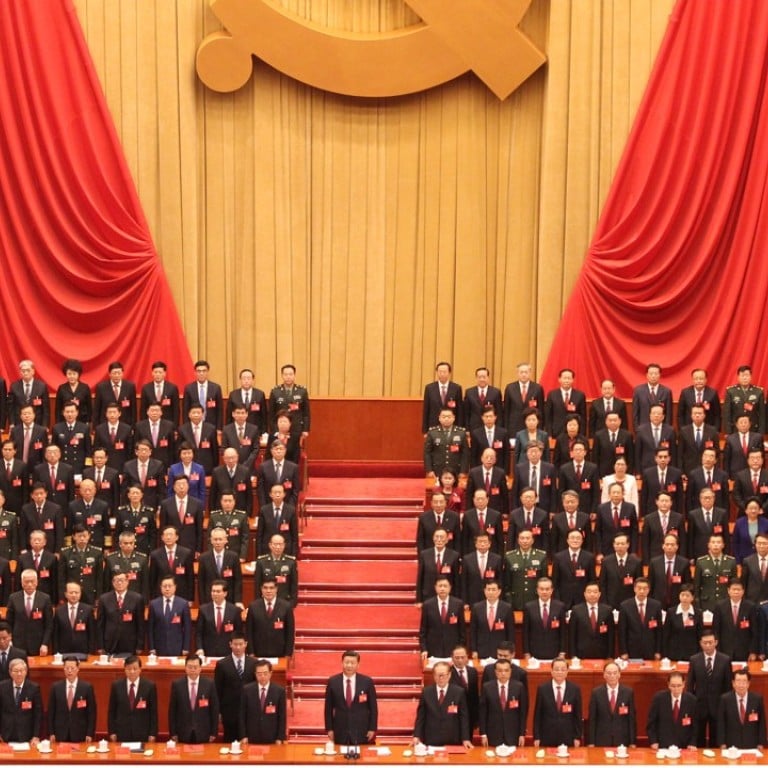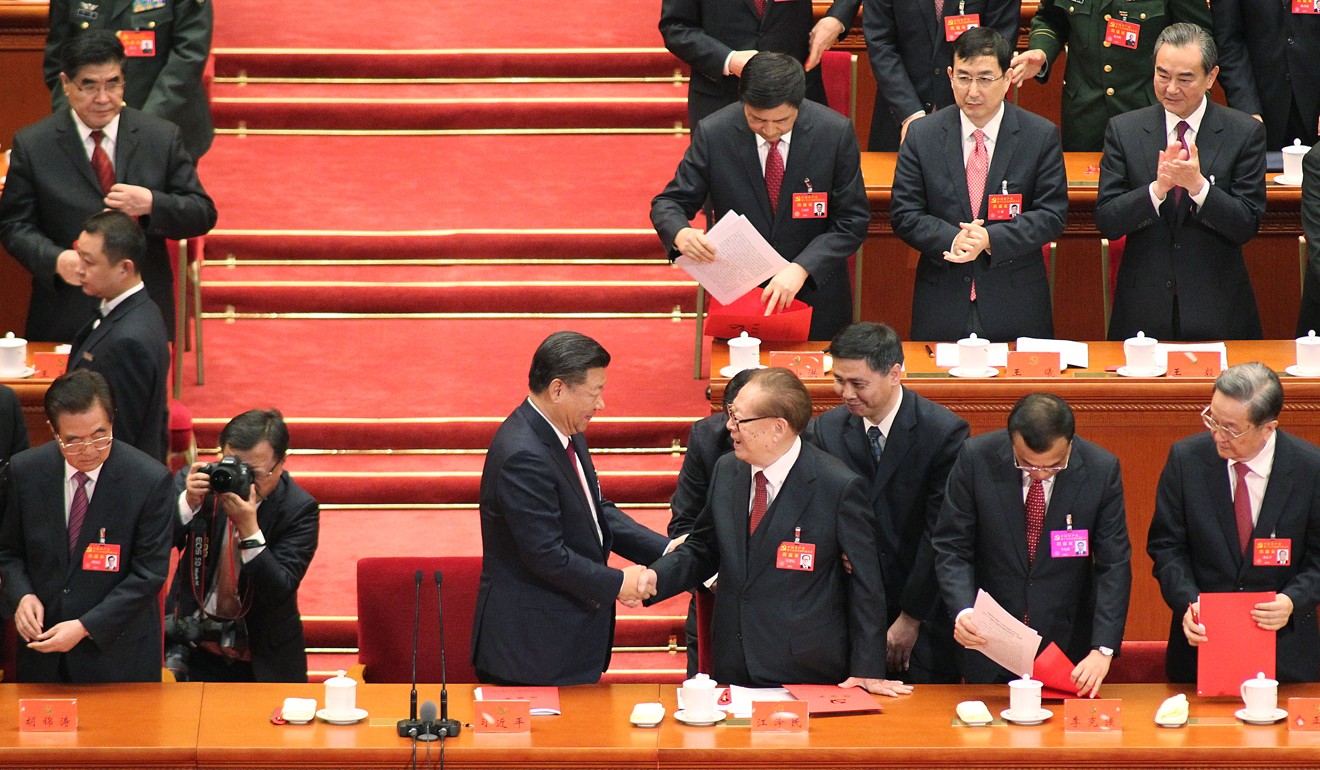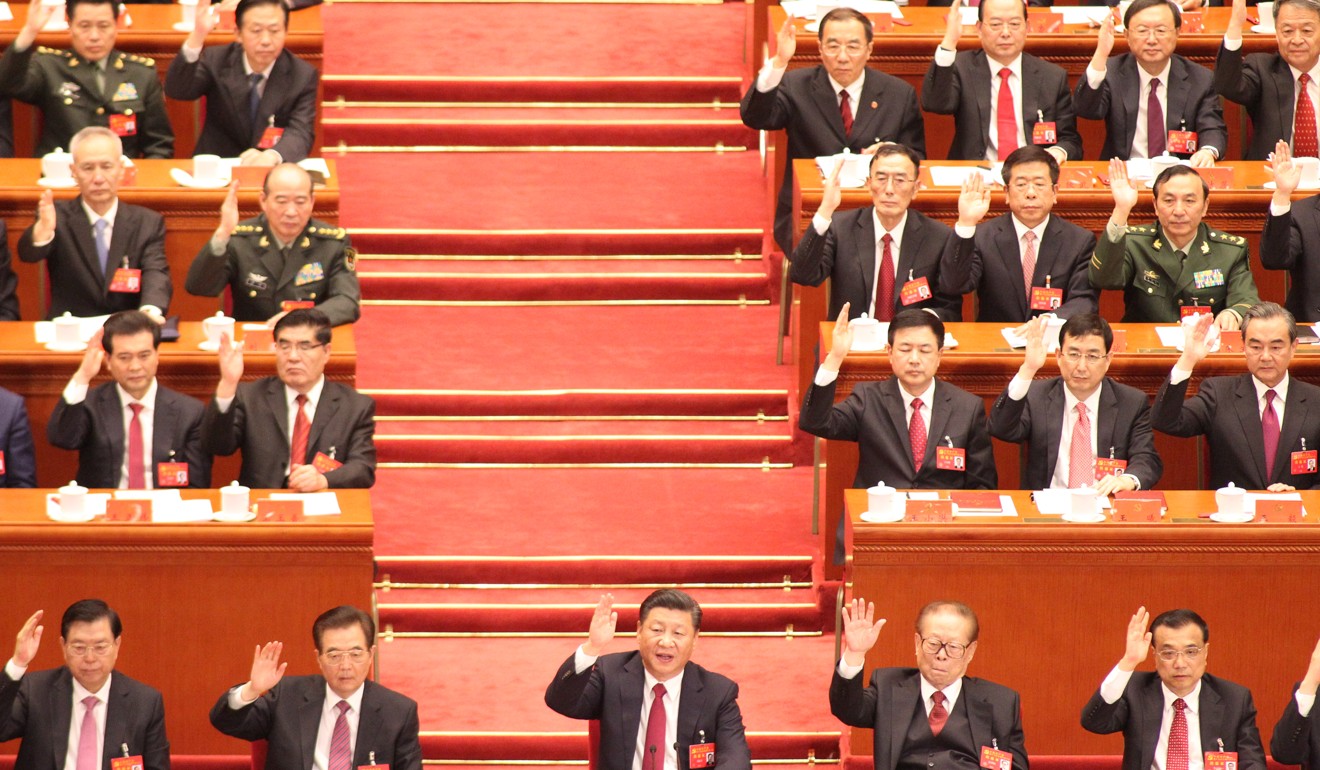
Congress concludes with President Xi Jinping as undisputed ‘core’ leader
Delegates elect 204 members of new-look Central Committee as anti-graft tsar Wang Qishan and vice-president Li Yuanchao step down
President Xi Jinping was elevated to the status of late paramount leaders Mao Zedong and Deng Xiaoping, securing an almost unchallengeable dominance over the Communist Party, which ended its week-long gathering on Tuesday with a newly elected Central Committee, the party’s elite decision-making body.
At the closing session in Beijing’s cavernous Great Hall of the People, Xi declared that his governing philosophy, officially titled “Xi Jinping thought on Socialism with Chinese characteristic for a new era”, had been added to the party constitution.
The widely expected move cements Xi’s rapid rise over the past five years as China’s most powerful man in decades as more than 2,300 carefully vetted delegates from around the country approved an amended party constitution carrying the name of the country’s new “core” leader.
The elevation of several of Xi’s protégés to the powerful Central Committee, which has 204 full members and 172 alternative members – the latter do not have voting rights – coincided with the departure of his key ally and anti-graft tsar Wang Qishan and China’s vice-president Li Yuanchao from the top leadership.
The absence of Wang, 69, a Politburo Standing Committee member and head of the Central Commission for Discipline Inspection (CCDI), from the full list of Central Committee members released by Xinhua confirmed an earlier report by the South China Morning Post.
Li Yuanchao, who at 66 is still below the official retirement age of 68, was also missing from the list, effectively meaning that he too will be stepping down from the Politburo.

Delegates also cast their votes behind closed doors to decide the 133 members of the CCDI. Zhao Leji, the party’s personnel chief, was named among them in a move that the Post said in an earlier exclusive report could pave the way for him to take the reins of the anti-graft agency after the congress.
Among the new members of the Central Committee are a large number of China’s new generation of politicians, several of whom are expected to emerge as contenders for the country’s top leadership roles in the future.
The country’s two leading bureaucrats on Hong Kong affairs – Zhang Xiaoming, the new director of the Hong Kong and Macau Affairs Office, and Wang Zhiming, director of the central government’s liaison office in Hong Kong – were among those to be voted on to the Central Committee.
The revamped group will meet for the first time on Wednesday when it will decide the make-up of the Politburo and its standing committee – the party’s innermost circle of power – and, in doing so, bring to an end months of behind-the-scenes power struggles and horse trading that are the trademarks of China’s twice-a-decade leadership reshuffles.
In a closing statement, delegates also hailed Xi’s opening address to the party congress which declared that China’s socialism building had entered a new era as a “guiding Marxist document” in a world of grim challenges threatening the survival of the one-party rule.
Under Xi’s leadership, it said China had “solved many tough problems that were long on the agenda but never solved, accomplished many things that were wanted but never got done, and prompted historic shifts in the causes of the party and the country”.
In a move to secure Xi’s political legacy, which will see his dominance over China’s politics well into the next decade, the revised party constitution also included the leader’s mantra on strengthening the party’s absolute control on the military and every other aspect of the society, and his pet belt and road trade and infrastructure plan.
According to analysts, the constitution has been amended at every national party gathering since it was adopted at the second congress in 1922.

As was the case five years ago, the closing session of the congress was not broadcast live on television, underlining the opaque nature of the personnel and policy issues surrounding the power shift.
In a politically charged show of unity, former presidents Jiang Zemin and Hu Jintao, and several other party elders, including former premiers Wen Jiabao, Zhu Rongji and Li Peng, who have rarely been seen in public in recent years, on Tuesday made their second group appearance in a week.
Xi, who opened the gathering with warnings of “grim challenges” threatening the survival of the one-party rule in a world of mounting uncertainties, appeared elated and declared that the meeting “has come to a victorious conclusion”.
The congress ended after incumbent and retired party leaders rose to their feet to listen to a rendition of the socialist anthem Internationale.
Julian Evans-Pritchard, an economist at Capital Economics Asia, said that Xi now had a level of power far beyond that achieved by his immediate predecessors Jiang Zemin and Hu Jintao, and which gave him an almost unprecedented degree of authority in pressing ahead with his political agenda.
“Given Xi’s clearly dominant position … [he] will face less resistance during his second term,” he said.
But he will still have to “resolve many of the key structural problems that threaten China’s growth prospects” he said.
Steve Tsang, director of SOAS China Institute in London, agreed that the revised party charter had put Xi in an almost unassailable position, as no one would dare to openly challenge his authority, as it would be seen as counter-revolutionary or even sabotage.
“But he is not yet able to eliminate resistance. Mao got ‘Mao Zedong Thought’, and Xi does not get that. The long-winded version in the party charter must reflect a compromise within the leadership,” he said.
Kerry Brown, a professor at King’s College in London, said that Xi’s elevation was hugely significant, but he questioned the substance of Xi thought, which he said was primarily a unifying tool for the political elite and could was not comparable to Mao thought.
“Everyone knows what Mao Zedong thought is,” he said. “But what exactly is Xi thought? The Four Comprehensives, the Chinese dream or the modernisation of Chinese socialism?
“Mao thought stressed that it was a tool to make people not only think differently but live differently. Will Xi thought enter the lifeblood of the Chinese people, or is it just a part of an elite political game utterly remote from Chinese people’s lives,” he said.
“Rightly or wrongly, for a brief moment Mao thought was a living faith. In 2017, the problem for the party is that while it’s practical delivery of stability is regarded as useful – for now – it’s language and ideology remain remote from the daily lives of Chinese people,” Brown said.
Additional reporting by Frank Tang

